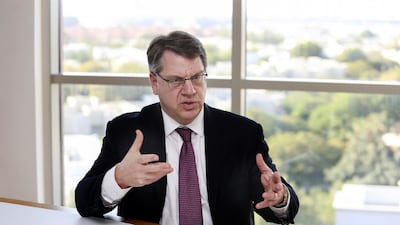For Rich Lesser, it’s all about how you handle “hard change”.
The president and chief executive of Boston Consulting Group, one of the top rung of the “Big Consulting” groups, Mr Lesser built his reputation at the firm, which he joined in 1988, on handling large-scale transformation in the healthcare and consumer sectors, which were his area of expertise.
But, since his “election” to the top jobs two years ago (at BCG the partners chose who will lead them), Mr Lesser has been extending that concept right across BCG’s global remit.
“What differentiates BCG is our ability to make really hard change happen for our clients, whether they’re private corporations or governments,” he says.
In the course of our hour-long meeting, squeezed in on the UAE leg of a punishing world tour, Mr Lesser uses the words “change” or “transformation” countless times: change in the global economy; transformation of the world energy industry; change in what clients expect from a consultant; transformation in the technological environment in which business operates.
He had come to Dubai straight from the annual meeting of the World Economic Forum in Davos, where the hot topic was the dramatically changing price structure of the global oil industry, so that is a subject fresh on his mind.
“Nobody really forecast this degree of oil price fall. Our job is to help clients prepare for the different scenarios they now face. We think that longer term the price will recover, to some degree, over the next 12-24 months, and the worst of the fall is now over. But there will be volatility, that is certain,” he says.
The reaction to the oil price fall by corporates and countries, he says, should be to adopt a “more holistic approach” of adopting a strategy that is right for the new environment and applying it. BCG can help the client find the strategy, but the client has to be persuaded to “take that journey with us”, Mr Lesser says.
“In this region, the national oil companies are strong. They have been building reserves and balance sheets.
“So I’d expect most of them to come through this period fine. There is no sense in just cutting for the sake of it,” he says.
He refers to Saudi Aramco, which insisted at Davos that it was not going to cut key investment: “They’re always going to be at the lower end of the cost curve, so it’s good for them to invest and it’s sensible to develop a sustainable strategy.”
Energy is one of BCG’s fastest growing areas of specialism. The others, from consumer and retail through to the public sector, cover the full spectrum of business.
The firm has had a permanent presence in the region for the past eight years, since it opened up in Dubai. That office is the hub of a growing network that takes in Abu Dhabi, Riyadh and a smaller presence in Beirut.
Saudi Arabia looks to be a future area for expansion. “Capital markets are finally opening up. The direction of change in Saudi Arabia is very positive,” he says.
BCG’s presence in the region is both newer and smaller than some of the competition in the world of Big Consulting, often defined in the acronym “MBBB” for McKinsey, BCG, Bain and Booz.
Mr Lesser declines to identify where in the pecking order of Bs his firm lies, but says cryptically: “There are two leading firms and there is a gap between them and the rest.”
The consulting industry is facing new pressures from ever-changing technology which is changing clients’ perceptions and expectations, and from the increasingly competitive race between the big firms to sign top talent.
“We invest over and over again in talent,” says Mr Lesser. “There is a very high bar to working at BCG, and increasingly we’re hiring people with industry expertise, whether directly in business or as specialist consultants elsewhere.”
Many consultants will begin with the big firms as graduate hires, then go out to industry before coming back into the consulting business in a senior position. “The client expects a team with mixed experience,” he says.
Turning investment bankers into consultants is no longer the big trend in the business. “In today’s world, investment bankers are less attractive than they were 10 years ago. Technology hirings are becoming more attractive,” he says.
The big trend over the past two years is the way global companies view technology, Mr Lesser says. “There has been a dramatic shift. Technology is not for the tech companies any more. Non-tech businesses now put it at the front end of the business.”
After Dubai, Mr Lesser was off to China, where BCG has had a presence for 20 years. The country figures high on BCG’s global strategy but has proved to be “demanding”; America, the firm’s home market but which represents a comparatively modest 30 per cent of global business, is “doing better”; Europe, another big centre for BCG, is still “at risk”, he says.
Russia, Japan and Brazil are “challenging”, but Mr Lesser is impressed by the new Indian government’s “genuine” commitment to economic growth.
He is not allowed to talk in detail about clients in the UAE, but says they are more in the private than the government sector, although the two sectors overlap more here than elsewhere, he says. “In this region, the investment in talent is crucial. We’re helping as much as we can on the crucial issue of building talent in the region, especially in the digital space. Dubai has embraced it, but there’s still more to be done,” he says.
fkane@thenational.ae
Follow The National's Business section on Twitter

